Sunglasses are a vital accessory for boaters that provide protection from the sun’s harmful rays while enhancing visibility.
Boating takes place in an environment where the sun reflects off the water’s surface, intensifying its glare and causing eye strain. The constant exposure to UV light can also cause long-term damage to your eyes, making it essential to wear sunglasses that offer optimal protection.
In my years of boating, I’ve worn the wrong sunglasses and the right ones. I’ve even lost a pair or two along the way! Let’s take a look at all of the considerations you should make before purchasing a pair and I’ll throw in 10 solid recommendations near the end if you want to check out the various options out there.
Why Do You Need Sunglasses for Boating?
- UV Protection: One of the primary reasons why sunglasses are necessary for boating is their ability to protect your eyes from harmful UV radiation. The sun’s rays, particularly UVA and UVB, can cause significant eye damage over time, leading to cataracts and other vision problems. Nobody wants that in their future! Wearing sunglasses with 100% UV protection is crucial for boaters who spend extended periods out on the water.
- Glare Reduction: Glare is another major issue that boaters face while out on the water. Light reflecting off the water’s surface creates intense glare that can be blinding during full sun conditions or when fishing in low light situations. Polarized lenses are ideal for reducing this type of glare because they filter out horizontal light waves.
- Visibility Improvement:Sunglasses also improve visibility by enhancing contrast and reducing haze caused by atmospheric conditions like humidity or heat mirage. This feature is especially important during activities like fishing, where spotting fish beneath the water’s surface is critical.
- Durability: Boating involves exposure to saltwater environments which can be corrosive and damaging to regular sunglasses made of metal or plastic frames. It is essential to choose sunglasses made from durable materials such as polycarbonate or nylon that resist corrosion and breakage while being lightweight and comfortable enough for extended wear.
Wearing sunglasses while boating provides multiple benefits such as protecting your eyes from harmful UV rays, reducing glare, improving visibility, and ensuring comfort during prolonged periods on the water. As we continue, let’s explore the various features that make some sunglasses suitable for boating over others.
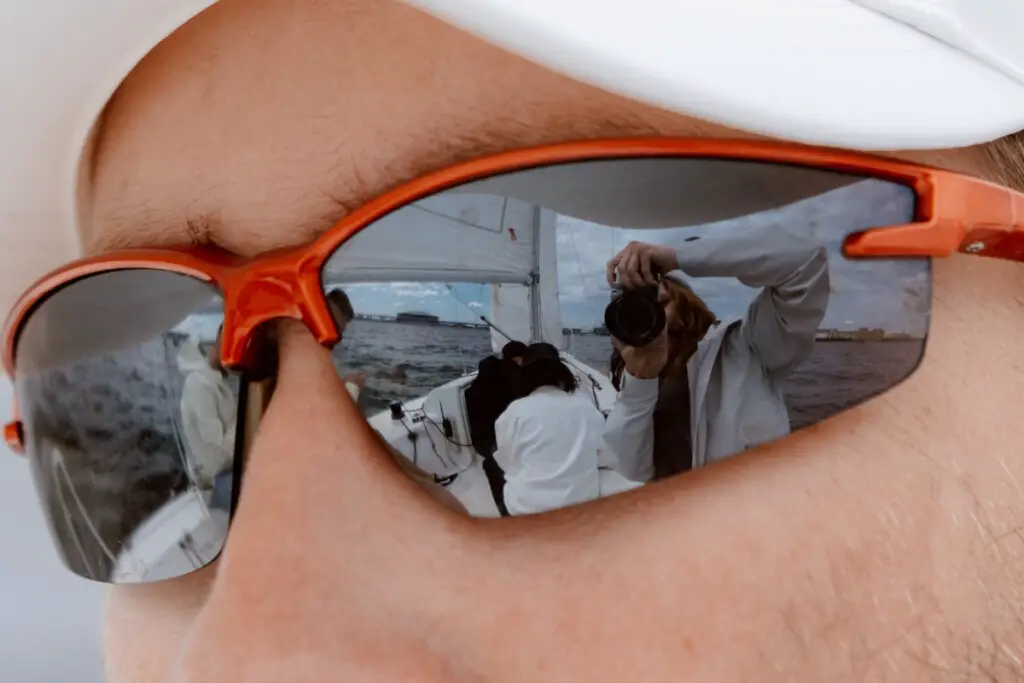
Important Features of Boating Sunglasses
When it comes to boating, wearing sunglasses is more than just a fashion statement. They are an essential piece of equipment that can protect your eyes from harmful UV rays, reduce glare and provide better visibility on the water.
However, not all sunglasses are created equal when it comes to boating. Here are some important features to consider before purchasing a pair of sunglasses for this purpose.
One crucial factor to consider when choosing boating sunglasses is durability. Boating exposes your eyes and glasses to saltwater, sand and other debris that can cause scratches on lenses or corrosion on frames.
Therefore, investing in non-corrosive materials such as polycarbonate, titanium or stainless steel can ensure long-lasting quality despite harsh environments.
Another critical feature is excellent coverage.

Boaters should look for sunglasses with large lenses that wrap around the face to block out peripheral light while providing clear vision ahead. This type of coverage also protects against wind and spray that could otherwise dry out or irritate eyes.
Don’t underestimate the amount of light that is reflected off the water from the sun and back into your eyes from the periphery. The strain over the hours will grind on you as the day goes on!
In addition, lightweight materials are also important for comfort during extended periods of use on the water without fatigue or discomfort. Selecting comfortable nose pads and earpieces will ensure glasses stay securely in place even during high-speed maneuvers or rough waters.
Lens type plays a crucial role in boating eyewear performance given the range of environmental lighting conditions encountered at sea from full sun to low light foggy conditions in early mornings or late afternoons fishing trips. Polarized lenses remain the top choice among boaters as they reduce glare from reflective surfaces such as water while improving contrast allowing for better visibility even under full sun conditions.
Mirrored lenses also help reduce glare but have greater color distortion especially under low light conditions which might be less suited for fishing activities where visual acuity is key. Taking into consideration all these features will enable you to select a pair of sunglasses suitable for high-performance water sports like boating while guaranteeing excellent protection against harmful UV rays – both UVA and UVB – ensuring your eyes are shielded from potential damage.
Non-Corrosive, Durable Material
When it comes to choosing the best sunglasses for boating, durability is a crucial factor. Boating sunglasses are exposed to harsh environmental conditions such as saltwater, wind, and sun exposure.
These elements can cause damage to low-quality sunglasses, which is why the frames of your choice must be made from non-corrosive and durable materials. One of the most popular materials for boating sunglasses is nylon.
Nylon frames are lightweight yet strong and resistant to heat and water exposure. They are also flexible, making them comfortable to wear for long periods while fishing or engaging in water sports.
Additionally, nylon frames are available in a range of colors that match any personal style. In addition to nylon frames, polycarbonate is another durable material used in boating sunglasses.
Polycarbonate is a type of plastic that is lightweight and impact-resistant. It offers excellent protection against UV rays while being comfortable on the face due to its flexibility.
Another material commonly used in boating sunglasses is stainless steel. Stainless steel frames offer superior durability against corrosion compared to other metals like aluminum or brass.
They also come with adjustable nose pads that provide comfort by conforming to different nose shapes. Titanium frames are exceptionally lightweight yet very strong and durable, making them ideal for outdoor activities like fishing or water sports.
They offer excellent resistance against corrosion from saltwater exposure while providing high levels of comfort even during extended periods of use. Choosing non-corrosive and durable materials for your boating sunglasses will ensure they withstand harsh environmental conditions such as prolonged sun exposure and saltwater exposure while providing maximum comfort during use on extended days out on the water or fishing trips.
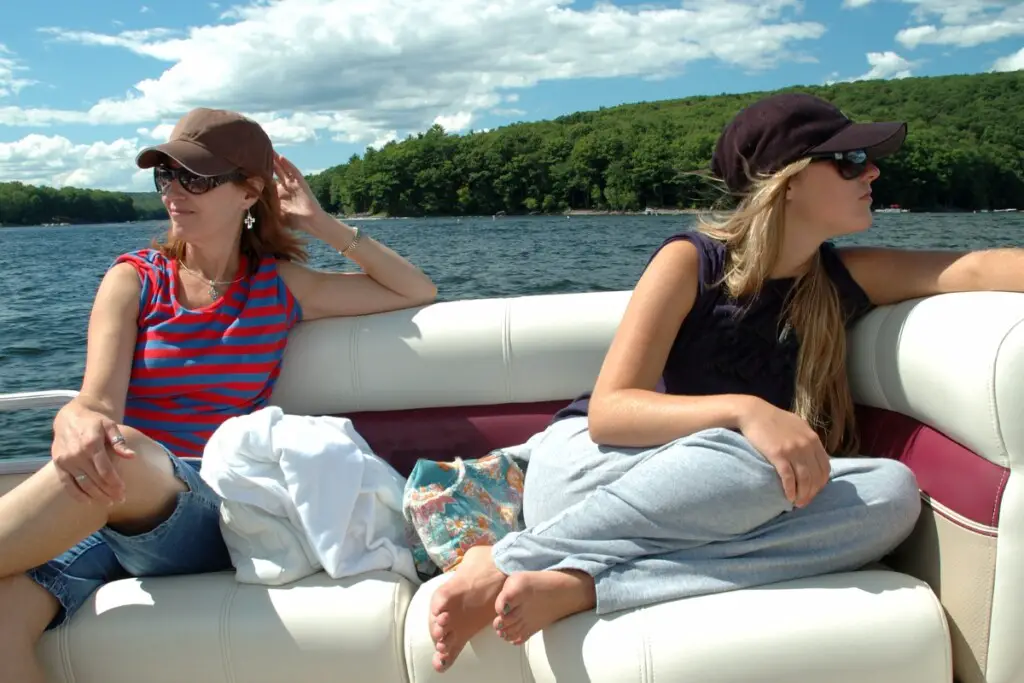
Excellent Coverage
When it comes to boating sunglasses, excellent coverage is a crucial feature. Sunglasses that provide full coverage protect your eyes from harmful UV rays and glare from the water while also reducing eye fatigue.
It’s essential to choose sunglasses with a wrap-around style that covers the entire eye area, including the sides, top, and bottom. Sunglasses that offer excellent coverage are especially important for water sports like fishing because they improve your visibility and help you detect fish below the surface of the water.
Additionally, they protect your eyes from flying objects and debris that may be present in windy conditions. Lightweight materials are essential when selecting boating sunglasses for maximum comfort while providing optimal coverage.
Nylon frames are an excellent option for their lightweight feel and ability to withstand harsh weather conditions. They are also highly durable and provide extended use.
Another factor to consider when choosing boating sunglasses is lens size. Larger lenses offer improved protection as they cover more of your face while also blocking peripheral light sources like sunlight reflecting off the water’s surface.
Consider adjustable features such as a secure fit with temple tips that allow you to adjust your glasses’ angle or bend them at will without causing any discomfort; this makes it easy for you to make small adjustments throughout the day depending on changing light levels or environmental conditions such as wind or low light situations. Selecting comfortable glasses ensures you can wear them all day without hurting your ears or nose bridges.
To conclude, when choosing boating sunglasses, look for those that provide complete coverage of your eyes in addition to being lightweight and durable. These features ensure optimal comfort while giving you clear vision in all weather conditions during a day out on the water.
Comfort
is an essential factor when it comes to boating sunglasses. You’ll be wearing them for long hours, and if they’re not comfortable, they can cause headaches and discomfort. Moreover, discomfort can distract you from enjoying your ride, which is the last thing you want while boating.
Therefore, it’s always a good idea to select sunglasses that provide optimum comfort. One of the most important aspects of comfortable boating sunglasses is their fit.
You’ll want sunglasses that fit snugly on your face but aren’t too tight or too loose. Sunglasses with adjustable nose pads and temple tips are the best option for achieving a perfect fit.
They allow you to customize the fit according to your face shape and size. Another crucial point when choosing comfortable sunglasses is their weight.
Heavy glasses can feel inconvenient and uncomfortable after wearing them for a few hours since they’ll weigh on your nose bridge and ears. Lightweight glasses are an ideal choice for long hours of wear because they won’t tire out your face muscles.
The shape of frames also plays a vital role in determining comfort level during water sports activities or fishing trips. Wraparound frames provide excellent coverage against sunlight, wind while ensuring minimum light leakage from sides without feeling tight on temples; hence they ensure maximum protection as well as comfort.
Choosing lenses with anti-reflective coating will increase overall comfort levels by reducing glares that reflect off water surfaces or boats in full sun conditions; this will improve visual clarity and reduce eye strain caused by prolonged sun exposure. Overall, investing in quality boating sunglasses equipped with features like comfortable frame design, lightweight materials, anti-reflective coatings on lenses will enhance the whole experience of water sports activities while providing maximum protection against UV rays and glare without sacrificing performance or comfortability.
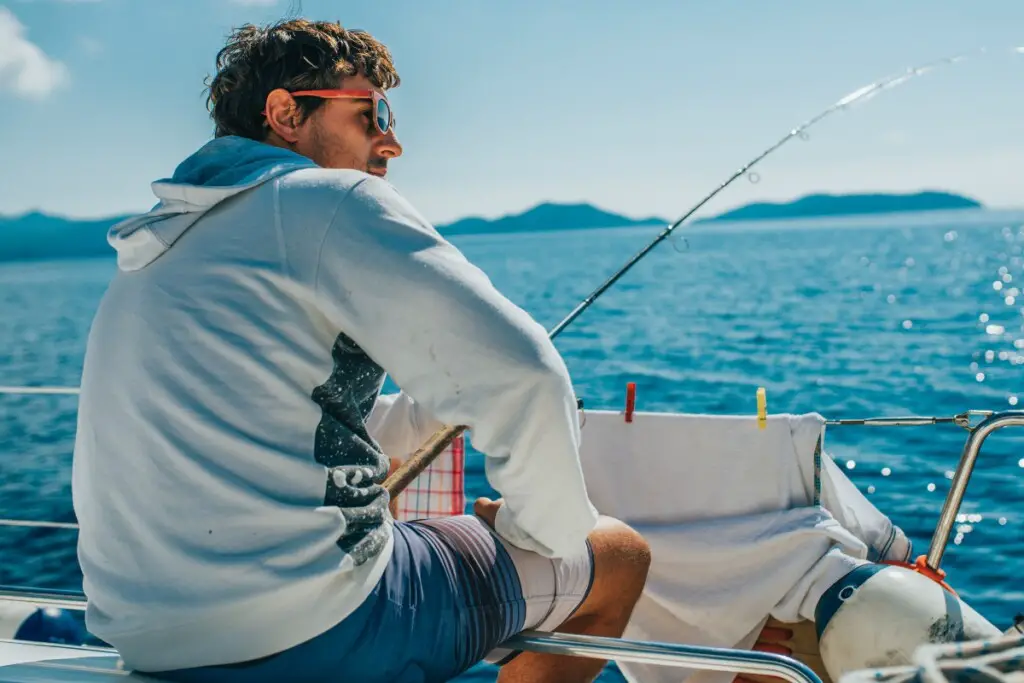
Lens Type
When it comes to boating sunglasses, the lens type is crucial for ensuring optimal visibility and eye protection.
There are several types of lenses available in the market, each with their own strengths and weaknesses. Polarized lenses are a popular choice for boaters as they help reduce glare from the water’s surface.
These lenses have a special filter that blocks horizontal light waves, which are responsible for creating glare on the water. Polarized lenses also enhance contrast, making it easier to distinguish between different objects on or in the water.
They are perfect for activities such as fishing or water sports where visual clarity is essential. Another type of lens commonly used for boating sunglasses is mirrored lenses.
These lenses have a reflective coating that reduces the amount of light entering your eyes while improving visual clarity. However, unlike polarized lenses, they do not offer significant reduction of glare from water surfaces.
For low light conditions such as early mornings or late evenings, yellow or amber-tinted lenses can be an excellent choice. These lenses improve visibility by enhancing contrast and depth perception while providing adequate UV protection.
If you plan on using your sunglasses both on and off the boat, photochromic or transition lenses can be a convenient option. These adaptive lenses change their tint depending on the amount of UV radiation they receive, allowing them to adjust to different lighting conditions throughout the day.
When choosing sunglasses for boating activities it’s important to consider lens types that offer maximum comfort and eye protection while enhancing visual clarity under full sun conditions or low-light environments depending upon what time period you will be boating in like early morning or late evening hours. Lenses like polarized ones help in reducing glare from water surfaces whereas mirrored ones enhance visual clarity but do not significantly reduce glare from water surfaces.
Polarized vs Non-Polarized
When shopping for boating sunglasses, one of the most debated topics is whether to choose polarized or non-polarized lenses.
Polarized sunglasses are a popular choice among boaters since they help reduce glare from the water surface and enhance visibility. The polarization filter helps to block horizontal light waves that reflect off the water surface, reducing eye strain and improving visual clarity.
On the other hand, non-polarized lenses do not have any filtering capabilities, making them less effective at reducing glare. However, they can be a good option for low-light conditions and may offer better color perception compared to polarized lenses.
Non-polarized sunglasses are also often less expensive than polarized ones. While polarized lenses offer superior glare reduction, they may not be suitable for all types of water sports.
For instance, anglers who need to see beneath the surface of the water may find that polarized lenses reduce their ability to detect fish in certain lighting conditions. Additionally, some pilots and drivers should avoid using polarized eyewear as it can interfere with instrument readings.
It’s important to note that both types of lenses provide UV protection and are available in various tints to suit different lighting conditions. The decision between choosing polarized or non-polarized sunglasses ultimately depends on personal preference and intended use.
In addition to considering polarization when choosing boating sunglasses, it’s also important to consider lens color. Different lens colors can improve contrast in different lighting conditions – for example yellow or amber lenses can enhance contrast in low light while grey or green lenses provide good contrast in full sun conditions.
Ultimately it is up to the user’s personal preferences when selecting what type of lens will work best for their needs on the open water. Ultimately, when making a decision between polarised vs non-polarised shades one must take into account what kind of activity you plan on doing out on your boat trip along with what features are needed to make sure that you have a safe and enjoyable experience.
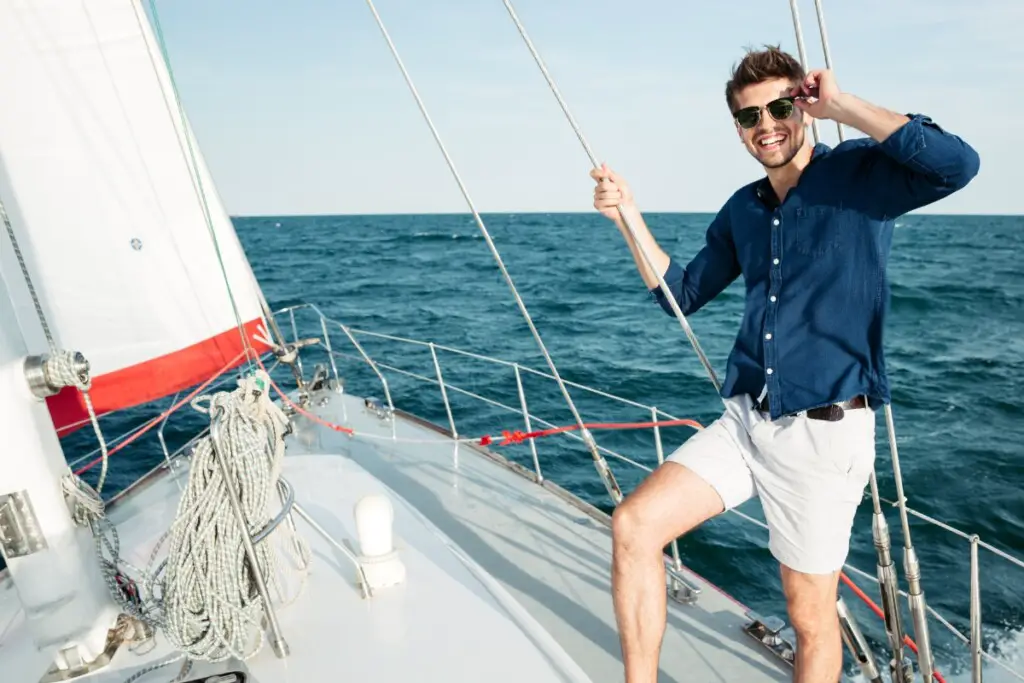
Mirrored Lenses
for boating sunglasses have become increasingly popular over the years. They are designed with a reflective coating on the outside of the lens, which reduces glare and increases contrast.
This feature is particularly useful when boating in full sun, as it helps to reduce eye strain and improve visibility on the water. come in different tints, including blue, green, silver, and gold.
These color options allow for personal preferences while still providing excellent protection. One of the benefits of mirrored lenses is that they provide additional UV protection by reflecting more light away from your eyes than regular lenses.
However, it’s important to note that not all mirrored lenses are created equal – some may offer more UV protection than others. When shopping for mirrored sunglasses for boating, look for those that provide at least 99% or 100% UV protection.
Another advantage of mirrored lenses is their durability. The reflective coating provides an extra layer of protection to the lens, making them more scratch-resistant than regular tinted lenses.
This feature is especially important when participating in water sports like fishing or kayaking where your sunglasses may come into contact with rocks or other hard surfaces. Mirrored sunglasses can also be polarized or non-polarized depending on your needs.
Polarized mirrored lenses help to reduce glare and provide better visual clarity while fishing or boating in low light conditions such as early morning or late afternoon when sun reflection on water can be high. For those who participate in high-intensity water sports such as wakeboarding or jet skiing non-polarized options might be a better choice as they allow more light transmission through the lens.
If you’re looking for a pair of durable and comfortable sunglasses that will provide excellent coverage and protection during your boating adventures then consider investing in a pair of mirrored sunglasses with polarized capabilities if you fish often or know you’ll be out during low light conditions. With the variety of mirrored lens tint colors available, you can choose a style that suits your personal preference while still offering you the sun protection you need on the water.
Lens Color
The lens color is an essential factor to consider when choosing the best sunglasses for boating. It affects how you see the world through your lenses and can enhance visual clarity in different environments.
Different lens colors provide varying levels of contrast, depth perception, and light transmission. The most common colors of boating sunglasses lenses include grey, brown, green, and rose.
Grey lenses are the most popular choice for boating sunglasses as they provide true color perception without altering natural hues. They are ideal for bright days with full sun exposure as they reduce glare without distorting colors or brightness level.
Moreover, grey lenses offer excellent UV protection and are perfect for water sports where there is a lot of glare from water.
Brown lenses are also a great option for boating sunglasses as they enhance contrast in low light conditions while reducing glare.
They work well on partly cloudy days or early mornings/evenings when the sun is not too bright. Brown lenses help to improve depth perception that is crucial when fishing or navigating around obstacles.
Green-tinted lenses have similar properties to brown but offer better contrast enhancement in brighter settings without causing eye fatigue. They provide excellent glare reduction and high visual acuity under full sun exposure.
Rose-colored lenses have become increasingly popular among anglers and boaters due to their ability to enhance visibility in low-light conditions such as dawn or dusk. They work best on cloudy days that require more light transmission than other darker shades of lens colors.
Choosing the right lens color depends on your needs and preferences based on weather conditions, time of day, and activity level during your boating adventures. Grey or brown tinted polarized lenses offer excellent protection against UV rays while enhancing depth perception and contrast reduction under full sun conditions; green-tinted provides better visual acuity under higher light exposure, while rose-colored enhances visibility during low-lighting environments such as early mornings or late evenings.
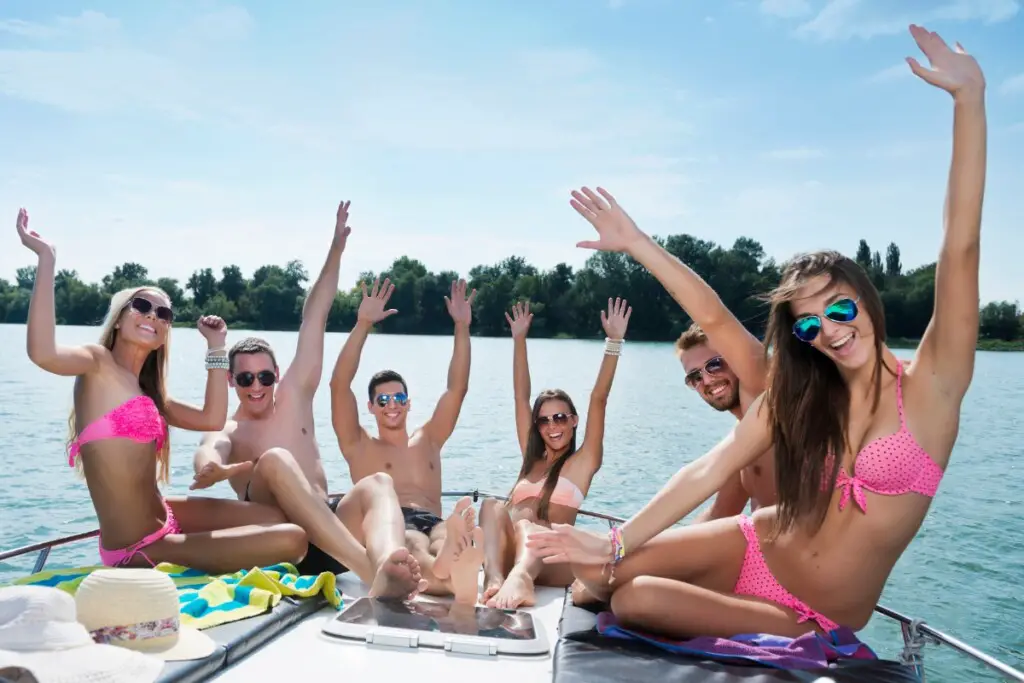
Top 10 Sunglasses for Boating
When it comes to boating, selecting the right pair of sunglasses is essential. The perfect pair provides comfort, protection from the sun’s harmful rays, and reduces glare off the water, allowing you to navigate safely and enjoy your time on the water.
Many of the options below will have various color options, so feel free to click on the links or images to see your options and current prices. Links lead to Amazon or the manufacturer’s website.
To help you choose the best sunglasses for boating, here are ten of our top picks:
1. Costa Del Mar Fantail: These polarized sunglasses come with 100% UV protection. With a sleek design and TR-90 nylon frame that is lightweight yet durable, these sunglasses are ideal for all-day wear on the boat.
2. Maui Jim World Cup: These polarized sunglasses provide superior clarity in any lighting condition while providing full sun protection. The large wrap-around frame provides excellent coverage while reducing glare.
3. Oakley Holbrook Polarized Sunglasses: Lightweight and impact-resistant lenses with 100% UV protection makes these a great choice for boaters who desire high-quality materials and performance. 4. Smith Optics Guides Choice Sunglasses: Ideal for anglers since they reduce glare significantly without compromising color accuracy or clarity in low light conditions.
5. Ray-Ban Aviator Classic Sunglasses: A timeless classic that remains popular due to its excellent polarized lenses combined with a comfortable fit that makes them suitable for all-day wear on your boat.
6. Wiley X Tide Polarized Sunglasses: Designed specifically for water sports with polarized lenses that provide excellent glare reduction along with ANSI Z87+ safety rating (impact-resistant).
7. Tifosi Tyrant 2.0 Polarized Wrap Sunglasses: You can swap out the lenses as they are interchangeable, making these a versatile option when fishing in different weather conditions or daytime/nighttime boating operations.
8. Under Armour Men’s Blitzing Wrap Sunglasses: With a robust yet lightweight ArmourFusion frame combined with an adjustable nose pad make these a great choice if you’re looking for comfort on your long days out at sea.
9. Electric California Knoxville Pro Sunglasses: These sunglasses are ideal for boaters who need lightweight, comfortable frames with polarized lenses that provide excellent visual clarity in a full range of lighting conditions.
10. Bollé King Sunglasses: Featuring polarized lenses with an anti-fog treatment, these sunglasses are perfect for boaters who frequently face fogging issues when moving from one environment to another.
When selecting the right pair of sunglasses for your next boating adventure, keep in mind that you should prioritize both comfort and UV protection. Ensure that the sunglasses fit well, so they don’t slip off your face when wet or during high-speed maneuvers on your boat. You can also purchase sunglasses straps or lanyards that attach to the back of the ear pieces for additional protection from losing them.
You should also consider how much coverage you want since larger lenses will provide more protection from the sun and reduce glare off the water. Ultimately, choosing the right pair of sunglasses is as important as selecting any other piece of safety gear when it comes to boating.
How to Choose the Right Sunglasses for Boating
When it comes to choosing the right sunglasses for boating, there are a few things to consider in order to ensure that you get the best possible pair for your needs. The first thing you want to look for is a pair of sunglasses that provides ample glare protection. This is especially important when you’re out on the water, where the sun and water reflections can create significant glare that can be dangerous if not properly managed.
Polarized lenses are particularly effective at reducing glare, so consider investing in a high-quality pair with polarized lenses. Durability is another key factor to consider when choosing sunglasses for boating or any other type of water sports.
You want a pair that’s made from non-corrosive materials and built to withstand the rigors of an active lifestyle. Look for frames made from materials like nylon or polycarbonate, which are lightweight, durable and resistant to impact damage.
In addition to durability and glare protection, comfort is also an important consideration when choosing sunglasses for boating. You don’t want a pair that’s going to pinch your nose or ears, or feel heavy on your face after hours of wear.
Look for lightweight frames with adjustable nose pads and temples that can be customized for maximum comfort. UV protection is essential when it comes to protecting your eyes from harmful sun exposure while out on the water.
Make sure you choose a pair of sunglasses with lenses that provide full UV protection (both UVA and UVB), as this will help reduce your risk of developing eye conditions like cataracts and macular degeneration later in life. When selecting sunglasses for boating or any other water sports activity, look for pairs with polarized lenses offering ample glare reduction while providing full UV protection.
Durable yet lightweight frames with adjustable nose pads will ensure maximum comfort throughout extended use while resisting corrosion caused by saltwater environments over time. Keep these tips in mind as you shop around so that you can find the perfect pair of sunglasses for your next boating adventure.
How to Clean Your Boating Sunglasses (Fresh and Saltwater Environments)
After a day of water sports or fishing, your sunglasses can become dirty and smudged. Proper cleaning is essential for maintaining the clarity of your lenses and ensuring that your boating sunglasses provide the necessary UV protection and glare reduction.
In this section, we’ll discuss how to clean your boating sunglasses in both fresh and saltwater environments.
For fresh water environments, it’s important to rinse your sunglasses with clean water to remove any dirt or debris before wiping them down with a soft microfiber cloth.
Avoid using soap or other cleaning solutions as they can leave streaks on the lenses. If there are stubborn stains on your lenses, you can use a small amount of mild dish soap mixed with warm water and gently rub the lenses with a soft-bristled brush.
When it comes to saltwater environments, it’s important to take extra care in cleaning your sunglasses due to the corrosive nature of saltwater. Before wiping down with a soft microfiber cloth, it is recommended that you rinse your sunglasses under running freshwater immediately after leaving saltwater environments.
This will help remove any residual salt from the frame, hinges, and lens area which could otherwise cause unwanted corrosion over time. If necessary, you can use mild dish soap mixed with warm freshwater on a soft-bristled brush.
It’s also important not to forget about the storage of your boating sunglasses when not wearing them in order to maintain their durability. It’s best practice to keep them in their case – out of direct sunlight – when not being worn.
Proper maintenance is key for prolonging the life of any equipment used during outdoor activities such as water sports or fishing. Cleaning boating sunglasses regularly maximizes their effectiveness at protecting against harmful UV rays while reducing glare so that full-sun conditions don’t strain eyesight unnecessarily while out on open waters.
Key Takeaways
Selecting the best sunglasses for boating is crucial to protect your eyes from the intense glare of full sun rays, flying debris, and water spray.
Choosing a pair of polarized sunglasses made with durable materials that can withstand the harsh environment of water sports is essential. The ideal pair will provide excellent coverage while still being comfortable and lightweight enough to wear for extended periods.
When looking for boating sunglasses, it’s important to consider lens type, color, and coating options that best suit your needs. Polarized lenses are ideal for reducing glare while fishing or navigating through waterways.
Mirrored lenses offer additional protection against bright sunlight and enhance visibility in low light conditions. Some top picks for boating sunglasses include Costa Del Mar Fantail 580P Polarized Sunglasses, Oakley Holbrook XL OO9417-01 Polarized Sunglasses, Maui Jim Peahi Polarized Sunglasses, and Smith Optics Guide’s Choice ChromaPop+ Polarized Sunglasses.
These models offer exceptional durability, comfort and UV protection. To ensure your sunglasses maintain their durability in freshwater or saltwater environments, regular cleaning is essential.
Use a soft cloth to wipe away any dirt or debris from the frame and lenses regularly. Additionally, avoid using household cleaners as they may damage delicate coatings on the lens surface.
Investing in a high-quality pair of boating sunglasses not only protects your eyes but also enhances visibility while enjoying water sports activities such as fishing or cruising on your boat. With numerous options available in the market today, taking time to select a suitable option will provide you with long-lasting benefits that will make every boating experience enjoyable.









